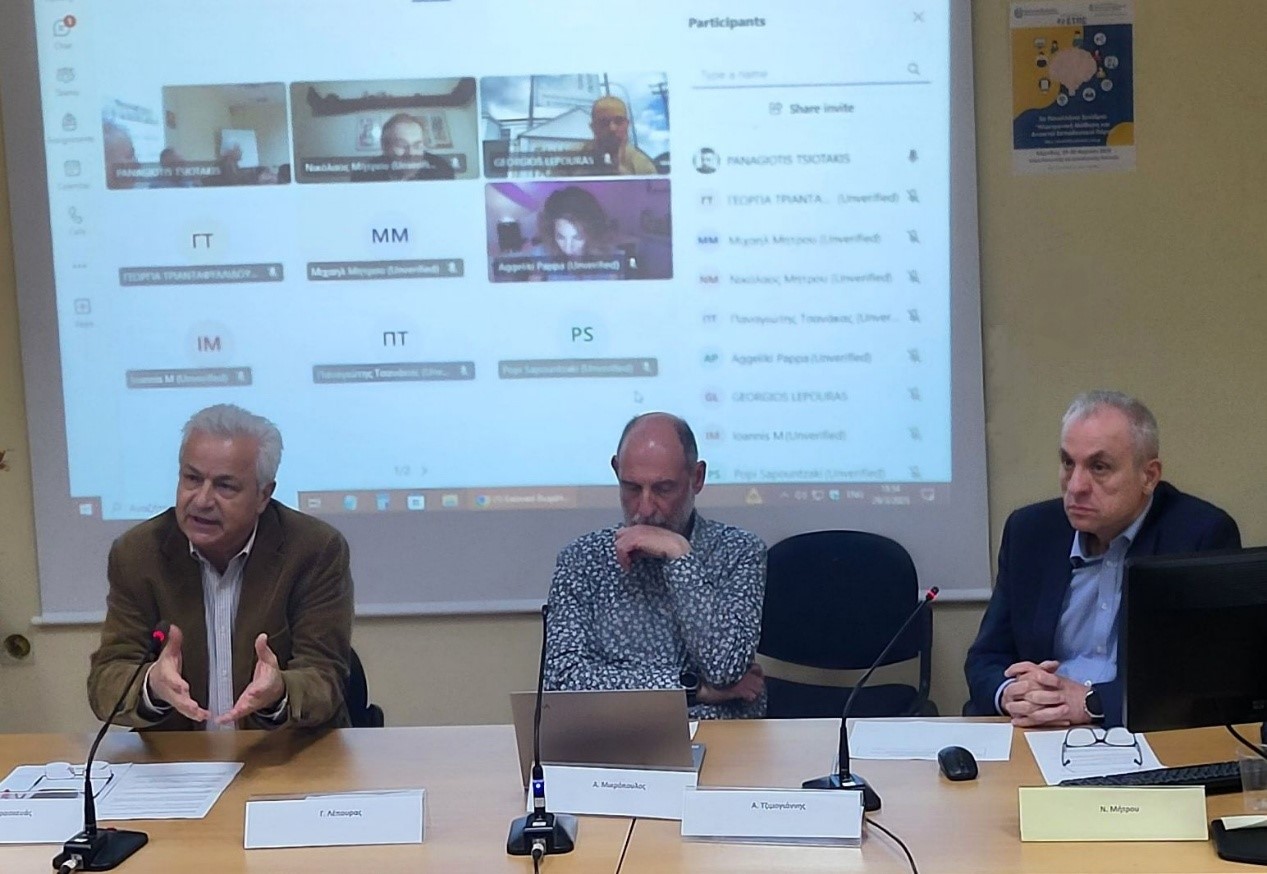Presentation of actions of the Computer Technology Institute and Press "Diophantus" that promote the use of Artificial Intelligence in Education, at the 5th Panhellenic Conference "E-Learning and Open Educational Resources", Corinth,29-30 March 2025
The actions of the CTI "Diofantos" that promote the use of Artificial Intelligence in Education were presented at the 5th Panhellenic Conference "E-Learning and Open Educational Resources", Corinth, March 29-30, 2025,
organized by the Department of Social and Educational Policy of the University of the Peloponnese and the Pedagogical Department of Primary Education of the National and Kapodistrian University of Athens, in collaboration with the Hellenic Association of ICT in Education (ETPE).
The announcement was entitled "Education in the Age of Artificial Intelligence: Challenges, Opportunities and the Role of the "Diofantos" Institute of Technology in Shaping the Digital Future of Education" , V.Deli , C.M.Liapis , M.Paraskevas , Z.Smyrnaiou and the presentation was made by Dr. Michalis Paraskevas, professor at the University of Peloponnese and vice president of the CTI "Diophantus" and coordinator of the NetLearn research group. In particular, the following actions were presented:
- School career guidance with machine learning: It concerns the career guidance of students through a digital platform based on machine learning. The platform includes diagnostic tools and suggests educational and professional options with personalized suggestions. A data warehouse is being created with data from mySchool, the National Schools and the labor market. Through business intelligence, analyses and predictive models are being developed. To date, the theoretical framework and psychometric tools have been completed.
- Innovation Centers in Education: It concerns the development of Innovation Centers in the 13 Regional Directorates, which enhance digital skills and promote educational innovation. The Centers focus on technologies such as Artificial Intelligence, Robotics, Augmented Reality and Metaverse. Specialized laboratories are created (AR/VR, AI & IoT, Robotics, FabLabs) that integrate innovative teaching approaches and develop 21st century skills, shaping a dynamic educational ecosystem.
- Interactive agent in the Greek School Network: It concerns the development of a chatbot based on Retrieval architecture Augmented Generation for the GSN helpdesk service. The chatbot combines information retrieval and linguistic text generation models to provide personalized answers, such as Llama - Krikri, Meltemi and Deepseek, while the model has already been trained with data from the GSN helpdesk service. The chatbot is expected to reduce response time to user requests, support multilingual users and improve communication.
- Artificial Intelligence in eTwinning collaborative projects: It concerns the promotion of AI in education through eTwinning. To this end, the Greek National Support Organisation for eTwinning offers an online course on the pedagogical use of AI, while in 2025 it will also offer a MOOC on the application of AI in eTwinning projects. In addition, it organized a multilateral Contact Seminar aimed at strengthening teachers' skills in AI, while the WELCOME eTwinning electronic magazine published scientific announcements by teachers regarding educational practices using AI.
Dr. Paraskevas also participated in the Roundtable entitled “Open Education in the Age of Artificial Intelligence: Challenges and Prospects”, which was held within the framework of the conference which took place within the framework of the conference, with participants Dr. Mitrou, professor of NTUA, Dr. A. Mikropoulos, professor of the University of Ioannina, Dr. G. Lepouras, professor of the University of Peloponnese and coordinated by Dr. A. Tzimogiannis, professor of the University of Peloponnese. During the discussion, Dr. Paraskevas stated that Artificial Intelligence (AI) algorithms contribute to personalized and differentiated learning as they can adapt educational materials and the educational process according to the pace, needs and capabilities of each learner. He emphasized the importance of learning data analysis, which identifies behavioral patterns and problems, thus providing valuable information to teachers to improve their teaching. He underlined the differences between AI and traditional ICT in education, explaining that, while the traditional ICT provide basic digital tools, AI introduces dynamic and self-improving capabilities that offer personalized learning experiences. He stressed the necessity of combining AI with existing teaching methods, as well as the need for investments in digital infrastructure in schools and universities and in targeted training of teachers at all levels. Finally, he pointed out the importance of interdisciplinary collaboration between educators and technologists for the development of innovative and sustainable solutions throughout the education system that will utilize AI, as well as the value of adapting university curricula to include Ethics of Technology courses in science ang engineering schools, as well as digital humanities in faculties of humanities, law and social sciences.
